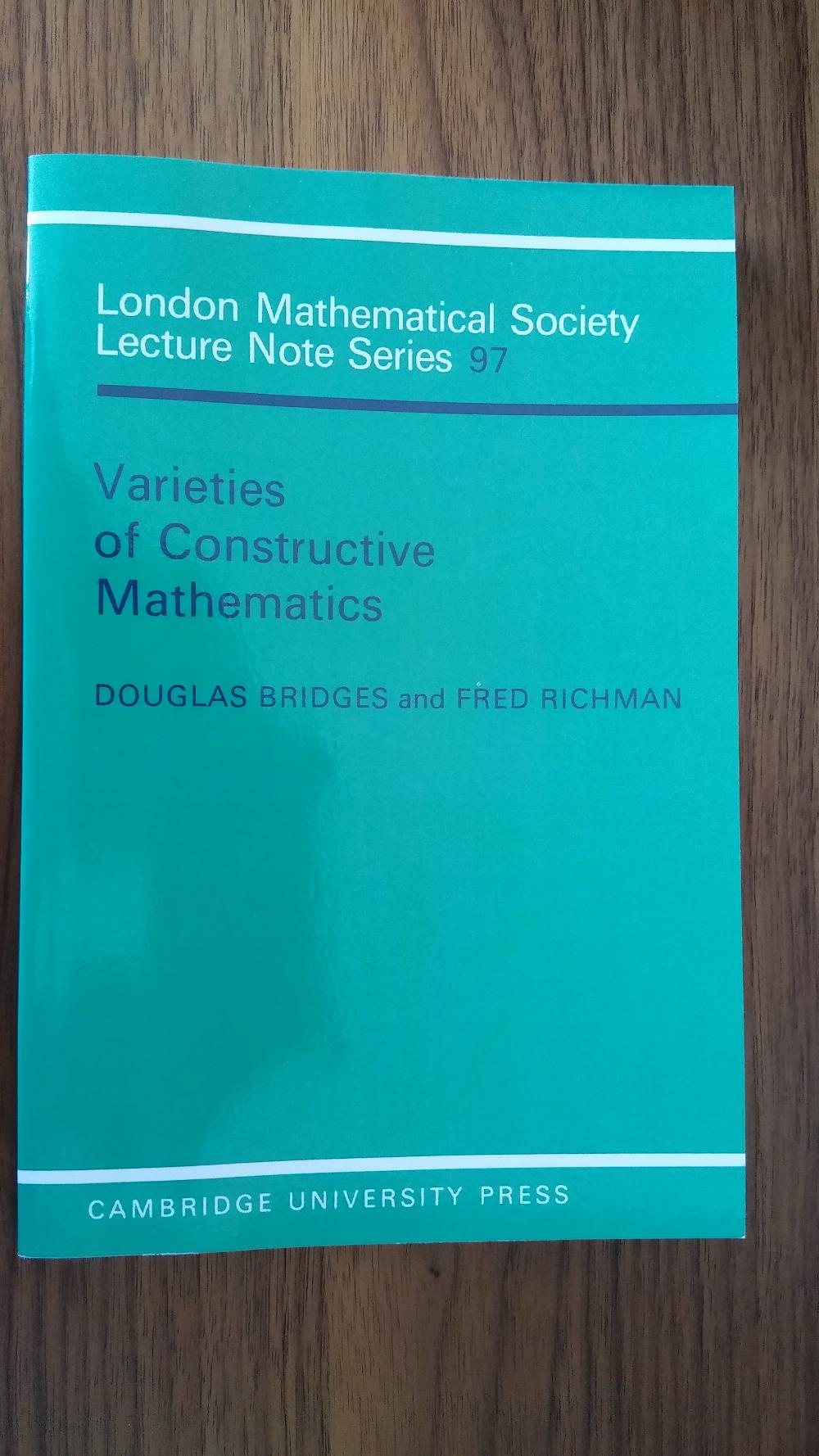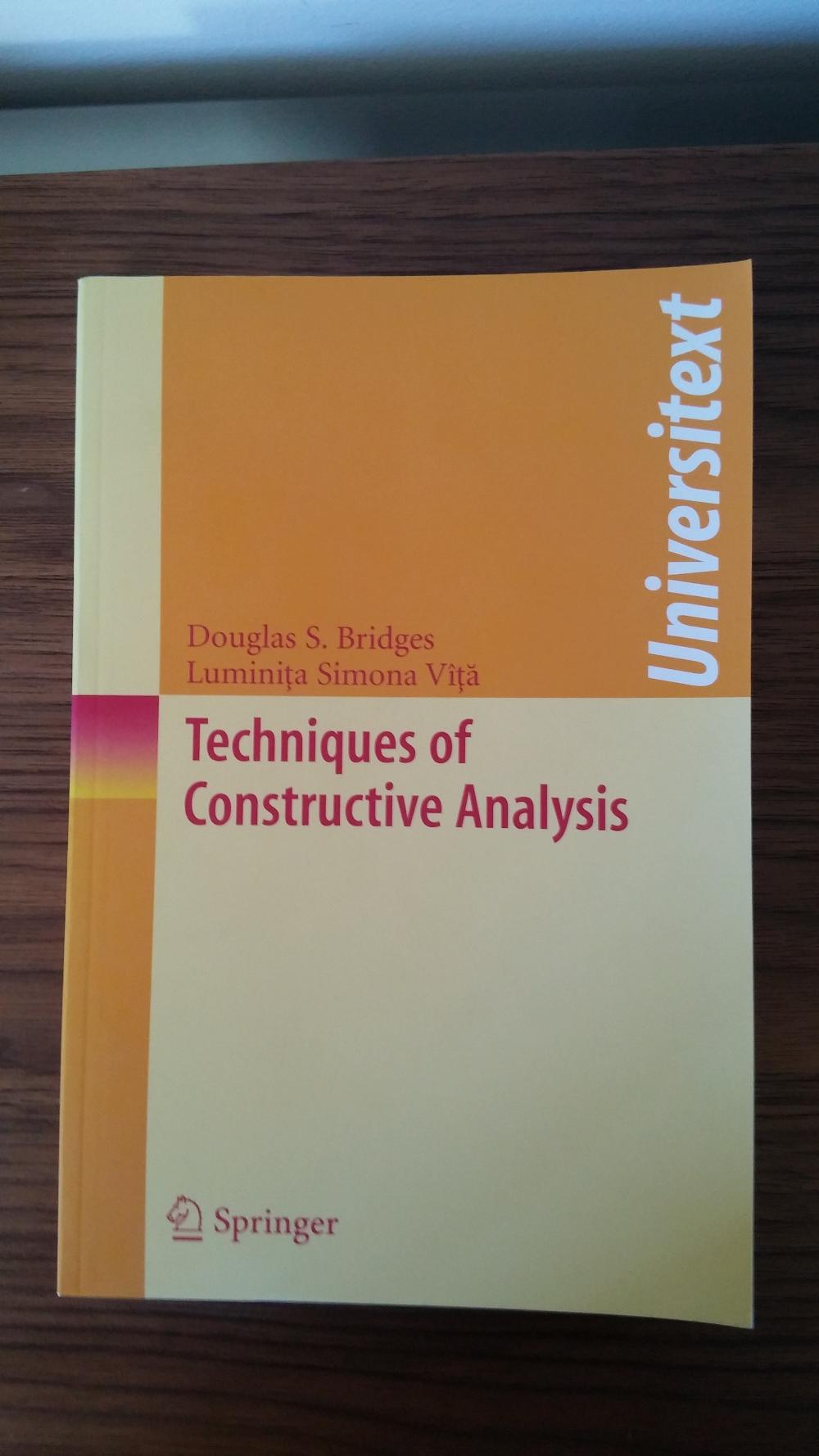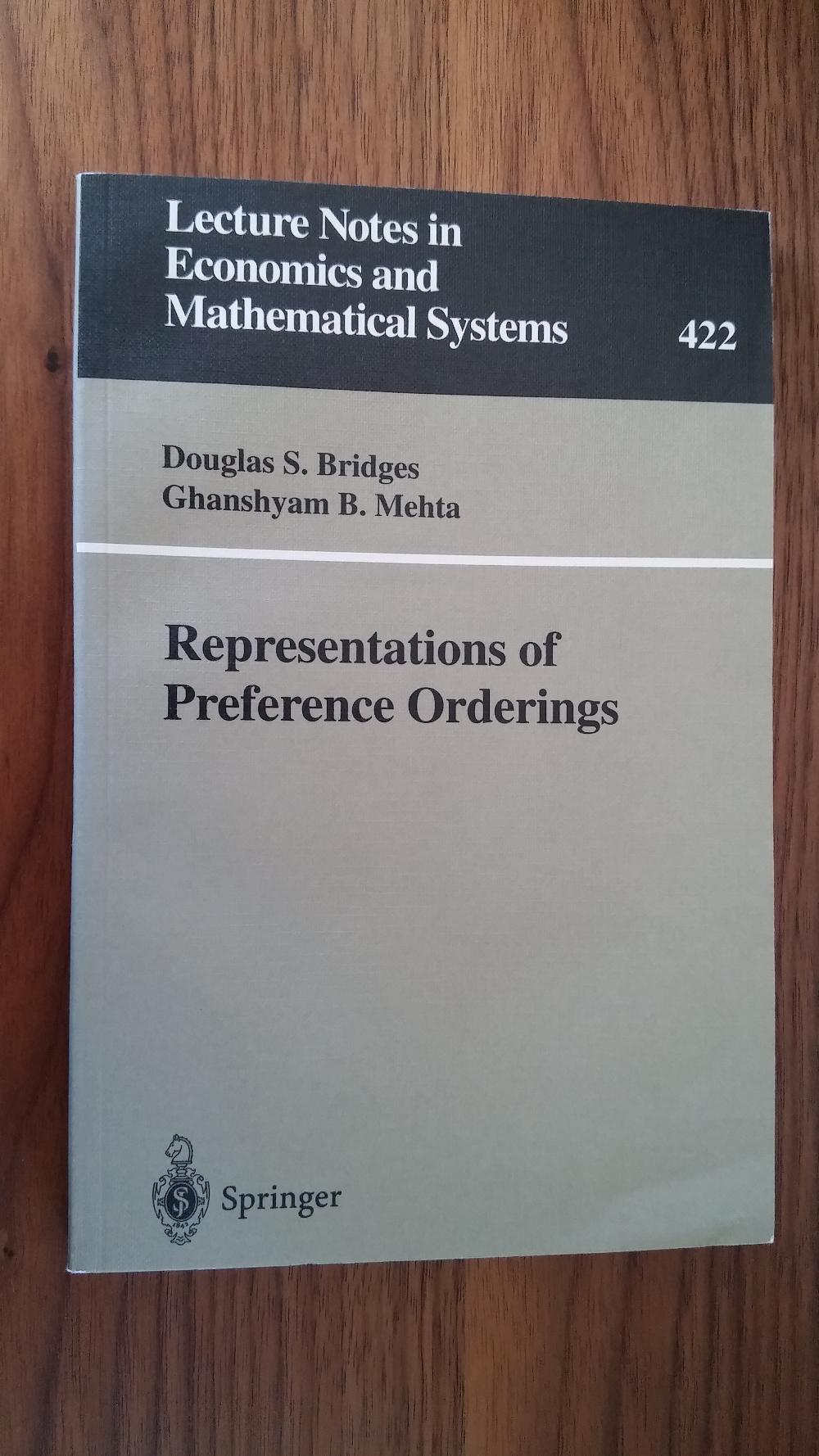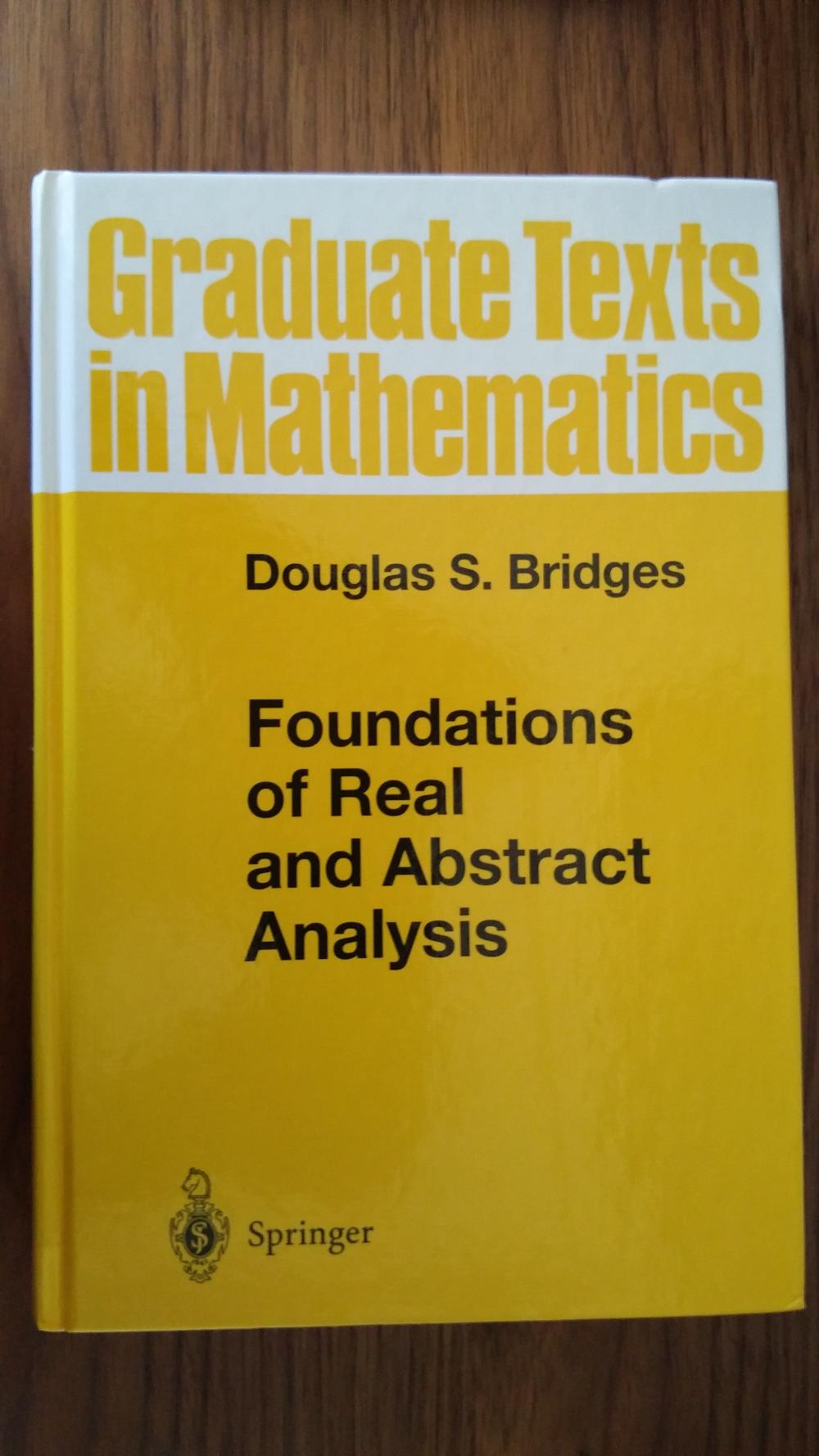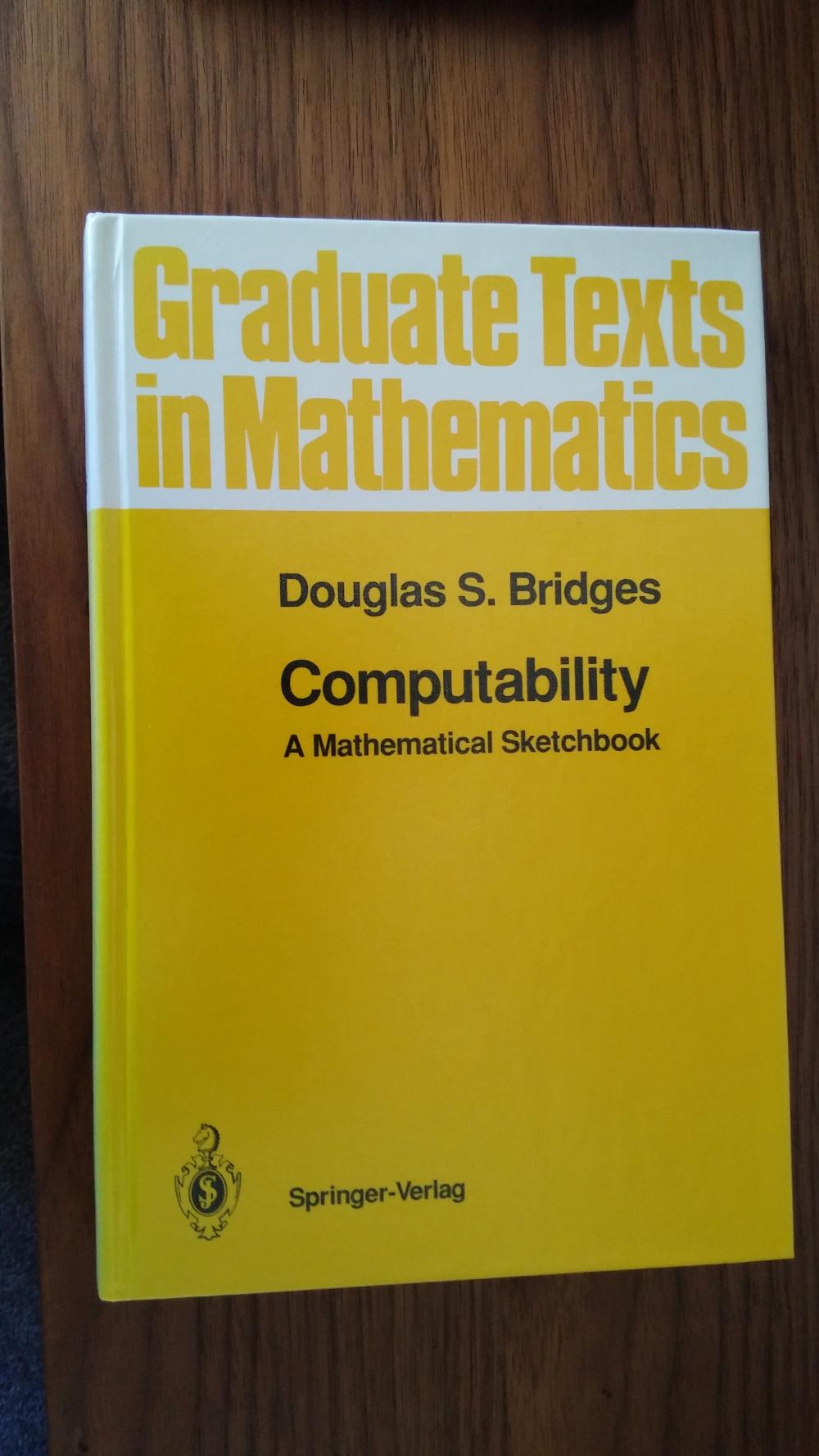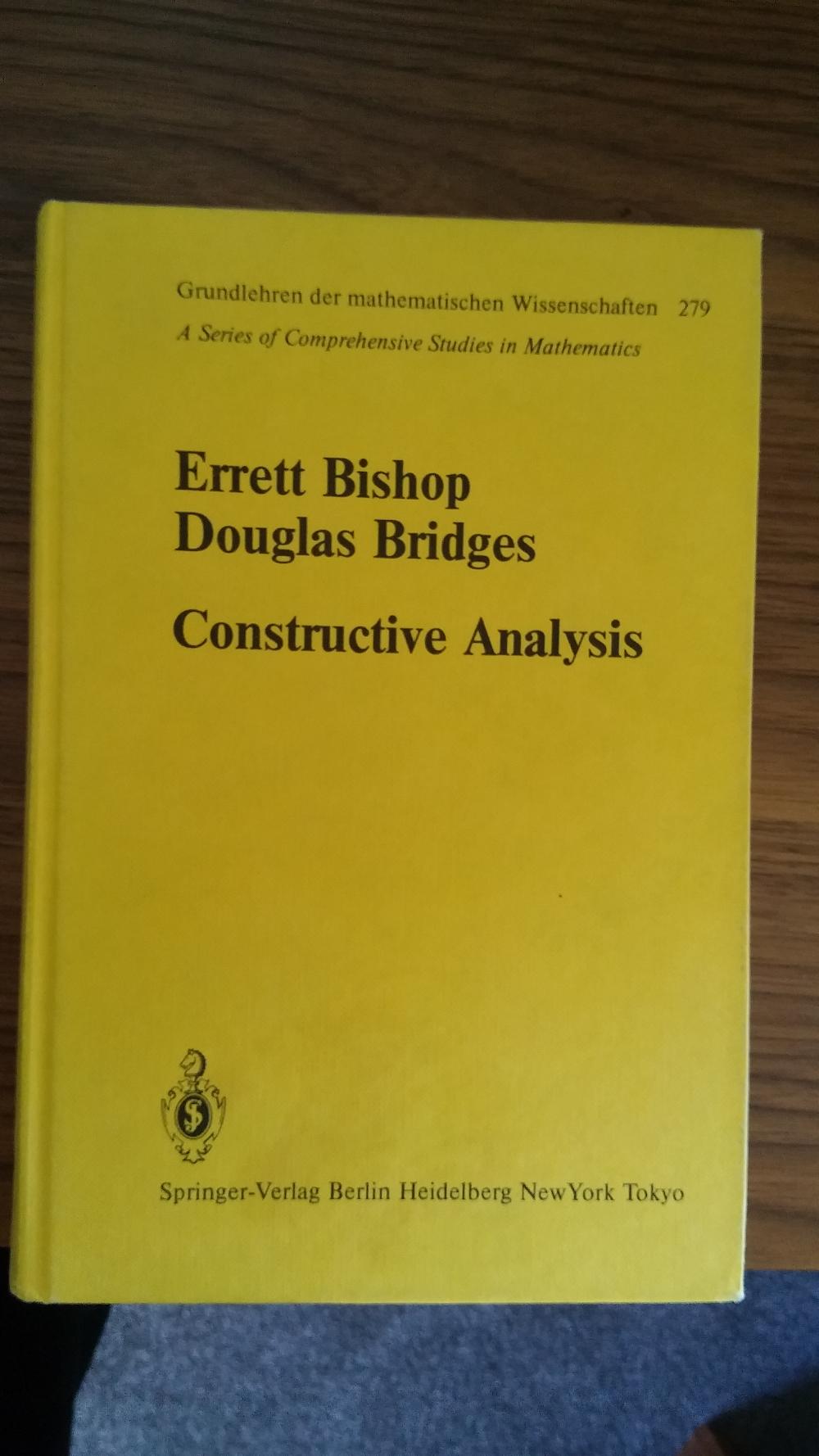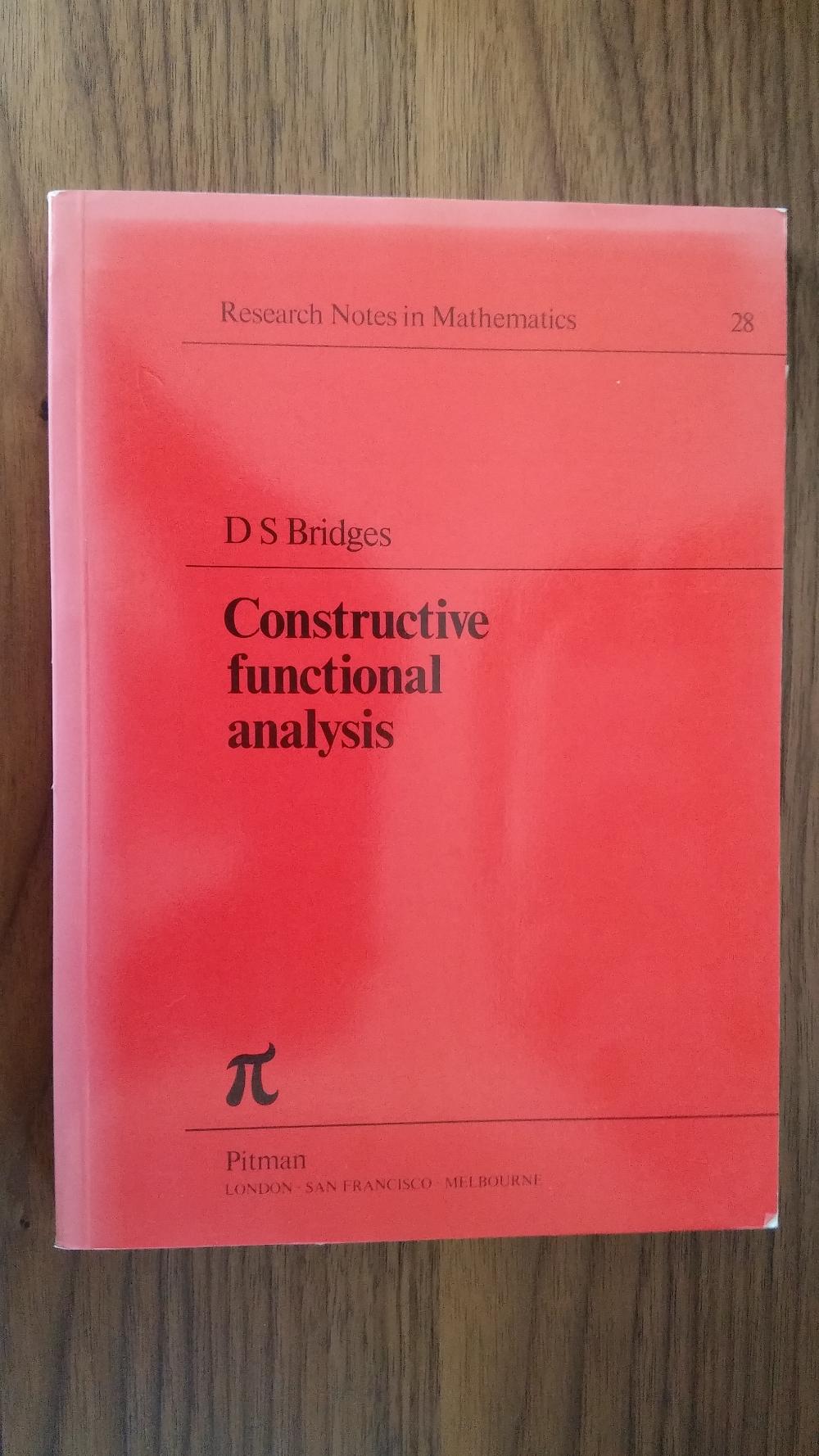Impressions of Errett
It is never easy to capture the essence of a man so richly endowed as was Errett Bishop; it is almost impossible when, as in my case, one's direct contacts with him were limited to a sporadic, topically limited correspondence over ten years, a brief meeting in a cafe in San Diego, and a five-week stay in his home while writing parts of a book together.
Four or five years after buying Errett's monograph Foundations of Constructive Analysis (FCA), when working on a D.Phil. on constructive mathematics I hesitatingly submitted to Errett a few typed pages of my work, dealing with a number of potentially useful properties equivalent to a result that (as I subsequently learned) was recursively false. His kind response encouraged me to further correspondence about my work over the next few years, a period in which, according to his letters and as a result of the hostile reception that he had frequently met when presenting his constructive mathematics to colleagues across the States, he had become almost completely withdrawn from mathematics. But it was not until, by a set of curious chances, Springer Verlag had put Errett and me in touch about the possible revision of FCA that we finally met in the flesh, in a cafe when my wife and I were passing through San Diego around New Year in 1980. At that meeting he reacted again with kindness to the idea of a very junior mathematician becoming Boswell to his Johnson; so began the collaboration which led, in 1985, to the appearance of our book Constructive Analysis.
Errett did not want FCA to be republished in its original form, and was unwilling to undertake himself the work that he deemed necessary to justify the reissue of the book. The revisions and additions to FCA proved so substantial that he eventually decided to regard our book as a new one, with a new title. From the outset, although the book was heavily based on FCA, Errett insisted that I be billed as co-author since I was going to do almost all the writing. This seemed characteristic of his encouragement of younger mathematicians.
Our modus scribendi was for me to put together a draft of a section and then submit it to him for his (often radical) alterations. The drafting was no easy task, since FCA was written in a highly condensed style and there were several subsequent papers, almost all technically hard and in one case containing major errors that were not easy to correct, that had to be incorporated; so Errett was often called upon to clarify something or, in the case of the defective paper (not written by him), to produce proofs that were not the absolute nonsense that had appeared in print. It always impressed me how clearly and promptly he returned the correct or completed arguments to me (this was, remember, in the days of airmail, when the time between sending a letter from England to California and receiving a reply was a minimum of about ten days). If there was a delay in his response, it was typically caused by the pains he took to lecture and assess a large calculus class (he assessed each of the many students by an individual interview).
It was only when, in November-December 1982, I spent five weeks in the Bishops' home in La Jolla, that I realised fully how fast a mathematician Errett was. He would write out long, new proofs in pencil on a pad on his knee, without even scribbled notes as a guide. (One proof that I recall being presented to me thus was the highly complicated one of the fundamental lemma of the chapter on Banach algebras.) After Errett had died, Paul Halmos, who had been his PhD supervisor at Chicago, told me that he had known one other mathematician who was as fast a thinker: John von Neumann, for whom Paul had been a research assistant at one stage. Need I say more?
A burning question for me, as for many who have read his work, was "How did Errett come to constructive mathematics in the first place?" He told me of two events that helped to precipitate him in that direction. The first was when he had been lecturing on truth tables in one of those low-level courses that he described unforgettably as "mathematics for gracious living". A couple of bright students had come to him after the lecture, to argue against his definition of (material) implication and in favour of the notion that the truth of the antecedent in some sense causes that of the consequent; this got Errett thinking about implication, a topic that bothered him right up to his death. The second event occurred in his own research in several complex variables, a subject in which he had a huge reputation before entering the constructive domain: in trying to visualise some hypersurfaces, he had come to the conclusion (perhaps through some kind of Brouwerian example?) that those surfaces could not be constructed in any real sense; from which he was led to ask what it meant to assert their existence. (Here I should state that this is a rough memory of a brief conversation more than thirty years ago; like all memories, its detail may not exactly reflect the original.)
Errett and his wife, Jane, were extremely kind and generous to me when I was, for six weeks, a guest in their home. We had many interesting conversations, all revealing the depth and breadth of Errett's interests, some showing amusing misconceptions about British society: for example, the not uncommon belief in the USA that the Queen has real political power. I learned that he was an avid collector of rocks - there was a magnificent collection of geodes in the house - and (this I discovered the hard way) a good and very competitive tennis player.
During my stay in La Jolla, Errett complained of stomach pains, which he attributed to an old hernia problem. Alas, it was much more: shortly after I returned to England, he wrote me a moving letter explaining that he had been given four months to live. Clearly, his involvement with the book was over, but he wrote extremely kind words about what I had done for him and encouraging me to finish the work. That letter, which, like all my correspondence with him, I still have, was the last I heard from him.
It took another two years for me to finish the book. At the final stage, I hunted through my Oxford Dictionary of Quotations to see if there was something that, as an epigraph, would serve as a fitting tribute to Errett. The one I eventually fixed upon (and which delighted Jane Bishop) was this:
As an epitaph for a mathematician who single-handedly showed that deep mathematics could be developed constructively, and thereby pulled the subject back from the edge of the grave, I can think of none better.
Quotes from Errett Bishop
"[The mathematician] does not believe that mathematics consists in drawing brilliant conclusions from arbitrary axioms, of juggling concepts devoid of pragmatic content, of playing a meaningless game."
"It appears than that there are certain mathematical statements that are merely evocative, which make assertions without empirical validity. There are also mathematical statements of immediate empirical validity, which state that certain performable operations will produce certain observable results, for instance, the theorem that every positive integer is the sum of four squares."
"The movement [Brouwer] founded has long been dead, killed partly by compromises of Brouwer's disciples with the viewpoint of idealism, partly by extraneous peculiarities of Brouwer's system which made it vague and even ridiculous to practicing mathematicians, but chiefly by the failure of Brouwer and his followers to convince the mathematical public that abandonment of the idealistic viewpoint would not sterilize or cripple the development of mathematics."
"Brouwer and other constructivists were much more successful in their criticisms of classical mathematics than in their efforts to replace it with something better."
"We are not contending that idealistic mathematics is worthless from the constructive point of view. This would be as silly as contending that unrigorous mathematics is worthless from the classical point of view. Every theorem proved with idealistic methods presents a challenge: to find a constructive version, and to give it a constructive proof."
"Mathematics is that portion of our intellectual activity which transcends our biology and our environment."
"Mathematics, a creation of mind, is less arbitrary than biology or physics, creations of nature; the creatures we imagine inhabiting another world in another universe, with another biology and another physics, will develop a mathematics which in essence is the same as ours."
"The primary concern of mathematics is number, and this means the positive integers. We feel about number the way Kant felt about space. The positive integers and their arithmetic are presupposed by the very nature of our intelligence and, we are tempted to believe, by the very nature of intelligence in general. The development of the positive integers from the primitive concept of the unit, the concept of adjoining a unit, and the process of mathematical induction carries complete conviction. In the words of Kronecker, the positive integers were created by God. ... Everything attaches itself to number, and every mathematical statement ultimately expresses the fact that if we perform certain computations within the set of positive integers, we shall get certain results. ... even the most abstract mathematical statement has a computational basis"
"Any computation that can be performed by a finite intelligence - any computation that has a finite number of steps - is permissible."
"Mathematics should and must concern itself with efficiency [of computation], perhaps to the detriment of elegance, but these matters will come to the fore only when realism has begun to prevail. Until then, our first concern will be to put as much mathematics as possible on a realistic basis without close attention to questions of efficiency."
"... idealistic tendencies have been present if not dominant in mathematics since the Greeks, but it took the full flowering of formalism to kill the insight into the nature of mathematics which its arithmetization could have given."
"Brouwer ... was an indifferent expositor and an inflexible advocate, contending against the great prestige of Hilbert and the undeniable fact that idealistic mathematics produced the most general results with the least effort."
"... mathematics so bizarre it becomes unpalatable to mathematicians..."
"Hilbert, who insisted on constructivity in metamathematics but believed the price of a constructive mathematics was too great, was willing to settle for consistency."
"others ... look for a short cut to reality, a point of vantage which will suddenly reveal classical mathematics in a constructive light."
You can edit text on your website by double clicking on a text box on your website. Alternatively, when you select a text box a settings menu will appear. your website by double clicking on a text box on your website. Alternatively, when you select a text box

.jpg)
